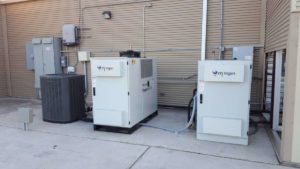 Texas businesses and homeowners are scrambling to buy back-up generators following last month’s Texas Blackout, calculating the benefits will outweigh the costs the next time a polar vortex pays a visit.
Texas businesses and homeowners are scrambling to buy back-up generators following last month’s Texas Blackout, calculating the benefits will outweigh the costs the next time a polar vortex pays a visit.
One reader complained, though, he couldn’t get an appointment until May 6.
Building your own mini-powerplant, if done thoughtfully, is not necessarily a bad idea and could shore up the state’s electricity grid, save everyone money and fight climate change.
An old-fashioned diesel or gasoline generator roaring behind the house, spewing exhaust, is not the solution. Those units are unreliable, rarely generate enough electricity and run out of fuel quickly.
The real answers are what the industry calls distributed generation and micro-grids. These are generators capable of taking businesses, homes or entire campuses off the grid for days—if not most of the time—and contributing to the grid when it needs a helping hand.
Five years ago, I wrote about a Houston start-up called M-Trigen, which developed a natural gas or propane-fired system capable of providing electricity, air conditioning and heat. The new chairman and CEO, Kevin Robert, told me their updated products could help.
“I don’t think people realize how much more electricity the world is demanding and where it’s going to come from,” he said. “We’ve got to pursue every form of energy we can find, and distributed generation and microgrids are part of the solution.”
Most Texans rely on power from the grid operated by the Electric Reliability Council of Texas, or ERCOT. The nonprofit offers to buy electricity from generators at higher and higher prices every day until it has enough supply contracts to meet the next day’s demand.
Most of the year, ERCOT does not have to pay much in the day-ahead market to meet the grid’s needs. Demand averages about 55,000 megawatts, while operators own more than 70,000 megawatts of capacity.
A few days or weeks every year, though, demand bumps up against supply, and ERCOT starts offering extremely high prices. When demand exceeds supply, or the generation promised the day before fails to materialize, ERCOT must cut power to hundreds, thousands or even millions of Texans.
M-Trigen can reduce risk by customizing an appropriately-sized generator with multiple capabilities. The company’s systems can create a micro-grid that remains online if ERCOT throws the switch by relying on the more dependable natural gas pipeline or an onsite propane tank.
Robert said the vast majority of M-Trigen’s clients remained online during the freeze.
The economics of a micro-grid, though, are complicated. Robert explained it depends not only on the difference in price between grid electricity and natural gas during different times of the year, but also how often the power goes out, what you are protecting and whether the larger grid will buy excess power from distributed generation.
Robert said some clients only want to run their generators when grid prices spike and ERCOT will pay them to take demand off the system. Others operate in places where M-Trigen’s power from natural gas is cheaper than grid electricity all the time.
Some only want M-Trigen as a back-up system or to provide heat. Robert said his system integrates exceptionally well with solar panels and can be cheaper than buying back-up batteries.
“We’ve found a lot larger application in the market and many more sectors than I ever thought,” he said. “That’s because we’re talking about a world that is electrifying itself, a world that wants to do that in a low carbon way.”
Natural gas and propane are fossil fuels and emit carbon, but the emissions are far less than from burning coal or oil. While some environmentalists hope batteries will eventually make fossil fuels obsolete, natural gas remains the primacy back up to wind and solar power for at least a decade.
Robert said his team has achieved very low carbon emissions by switching to a Toyota engine designed for natural gas and running a very lean fuel-air mixture. He’s also found a catalytic converter that eliminates almost all nitrous oxide to meet California’s clean air standards.
M-Trigen manufactures in Houston and is planning a Series A investment round to raise cash and ramp-up production. It’s not the only company building natural gas generators or micro-grids, but they have a unique product that points to the future of the grid.
As Texas officials decide how to sort out the financial chaos left by the Texas Blackout and guarantee reliability, we should take stock of new technology that can reduce demand and protect property. We should not move backward and reopen mothballed natural gas and coal-fired generators when there are so many ways to move forward.

